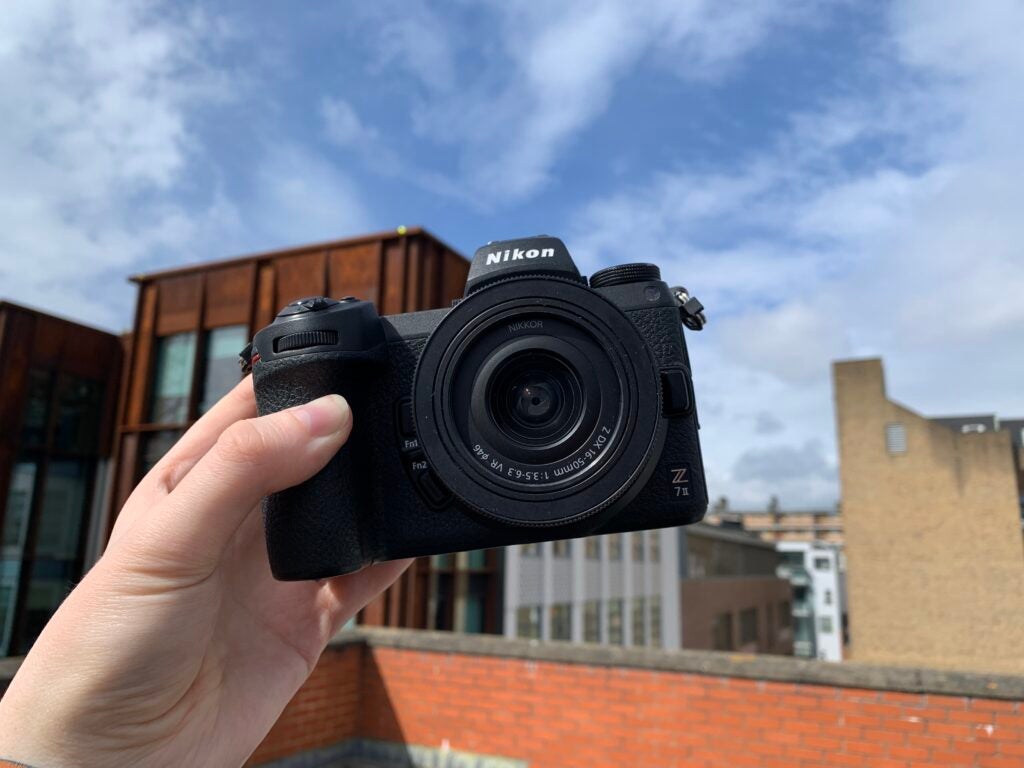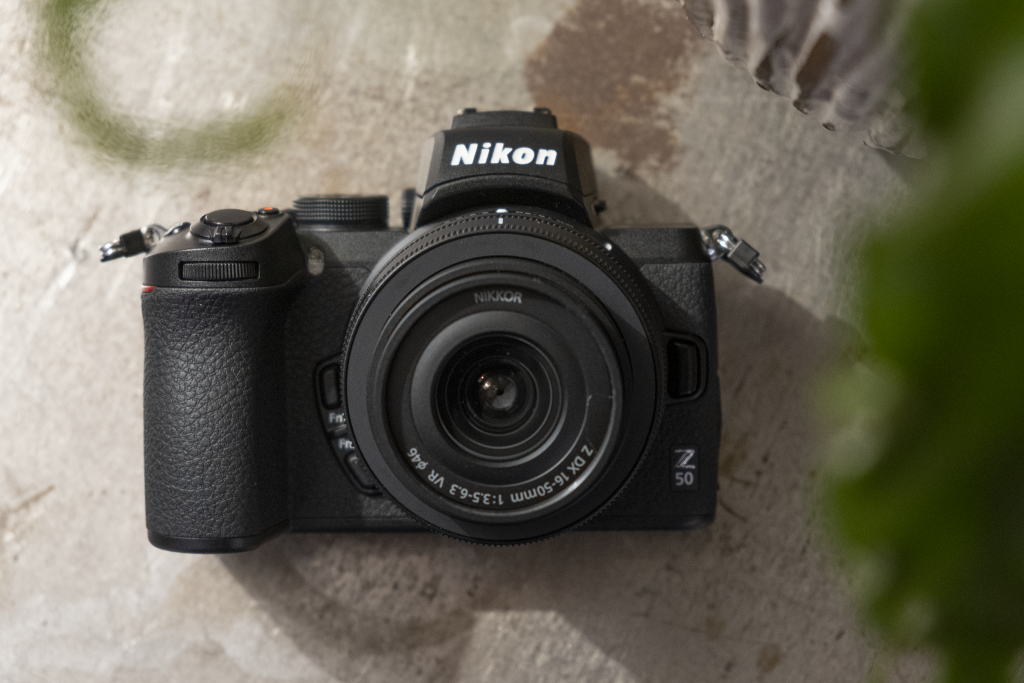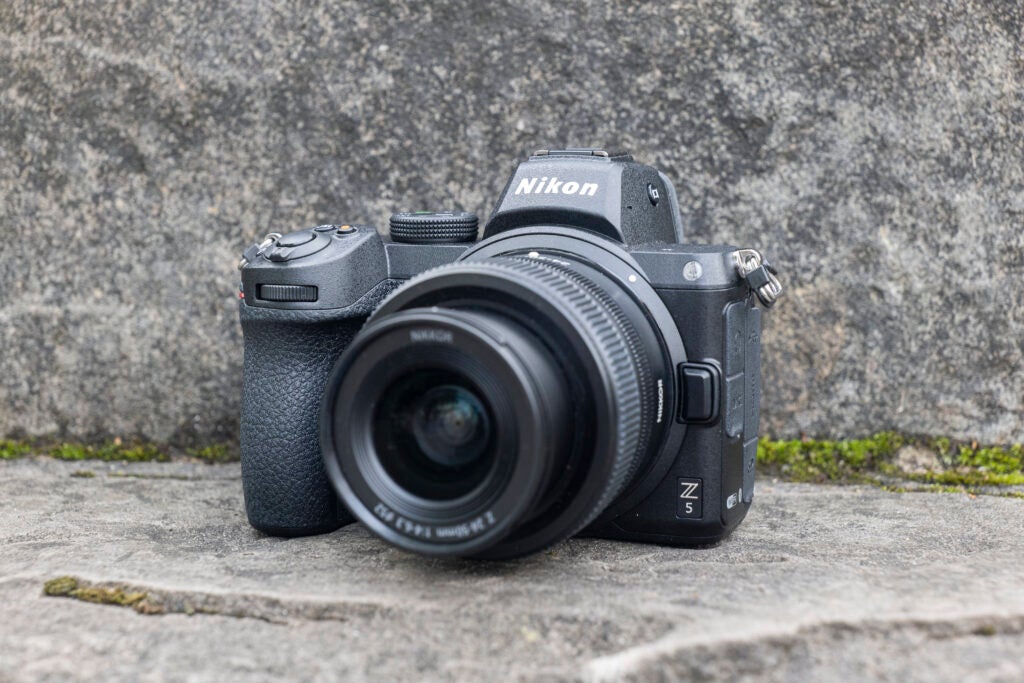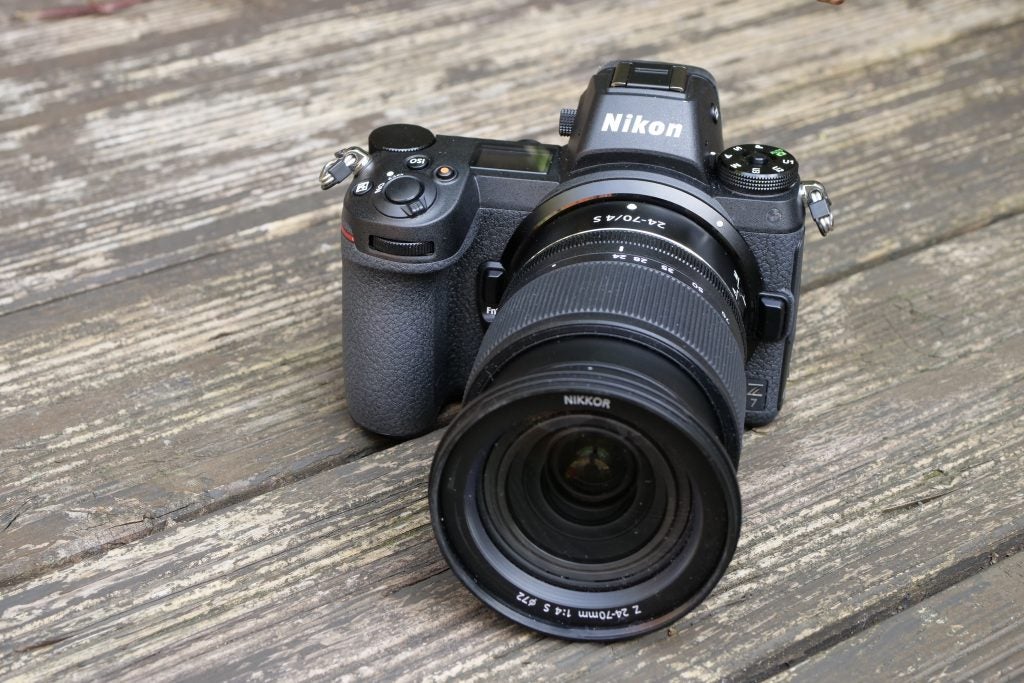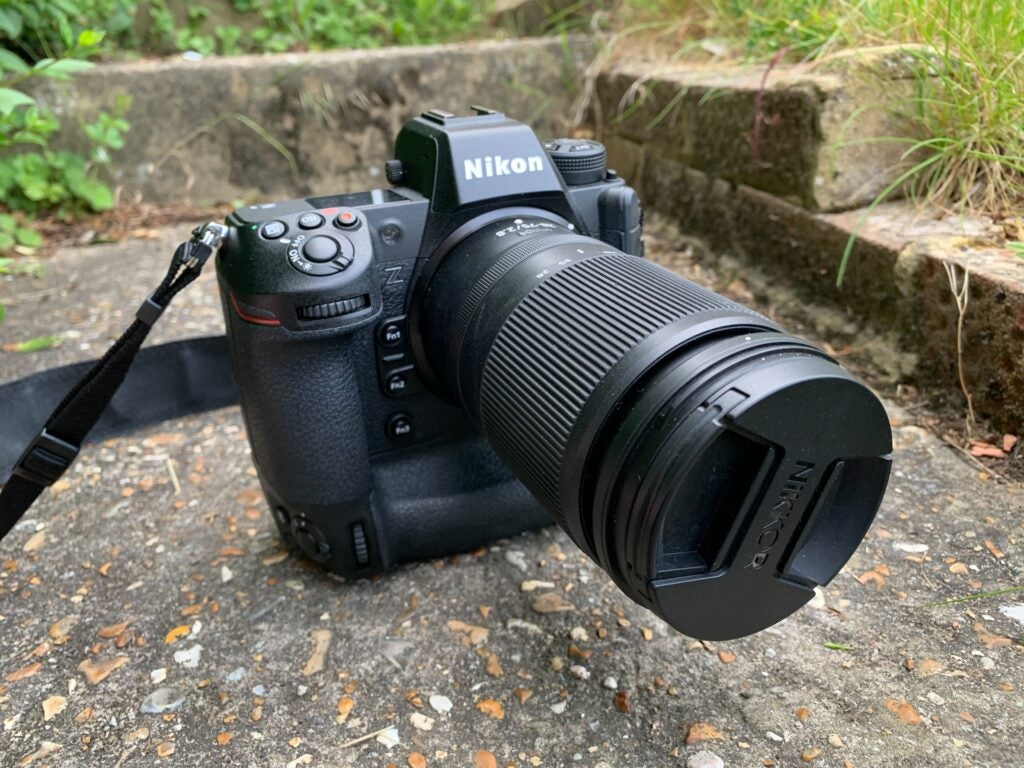
Verdict
The Nikon Z9 is an impressive all-rounder that offers 120fps shooting, fast autofocus and 8K video support in one package.
Pros
- Robust and versatile design
- 120fps shooting
- 8K video recording
Cons
- Expensive
- Large and heavy body
- Additional cost of CFexpress or XQD card
Availability
- UKRRP: £5299
- USARRP: $5499
- EuropeRRP: €5299
Key Features
- Full-frame sensorThe Z9 features a stacked 45.7-megapixel CMOS sensor and the Expeed 7 processor
- Large and rugged buildGrips along two sides mean you can move the camera comfortably between orientations. The camera weighs 1340g
- High frame rateThe Z9 is capable of capturing full-resolution RAW images at 20fps and 11-megapixel JPEGs at up to 120fps
- Advanced autofocus systemA 493-point AF system with 10 auto-area modes, human, animal, bird and vehicle-tracking plus 3D tracking, too
Introduction
If you’re looking for the most advanced camera in Nikon’s mirrorless lineup, look no further than the Nikon Z9.
This full-frame mirrorless camera sits at the top of Nikon’s Z line making it a more affordable alternative to the brand’s flagship DSLR, the Nikon D6 (that is, if you have a spare £5000 lying around).
Not only is the Z9 smaller and more lightweight – at least in comparison to the D6 – but it also boasts a more advanced autofocus system, a faster burst mode and support for 8K video over the DSLR.
It’s also cheaper than some of its high-end mirrorless counterparts, including Sony’s Alpha 1 camera.
Whether you’re a longtime Nikon user or a Canon or Sony fan thinking of jumping ship, this may just be the perfect time to make the transition from DSLR to mirrorless while you’re at it.
It’s been a year since the Z9 officially “launched” in the UK in December 2021 but only recently have we seen the camera fully stocked in most camera retailers, including Nikon’s own store.
That means you may be revisiting the idea of picking up the camera as a treat for yourself or someone very lucky this holiday season. If that sounds like you, read on to learn more about how I found the camera during my time testing it.
Design and Handling
- Large, heavy build
- Two grips and shutter-release buttons for easy portrait shots
- Requires a pricey CFexpress or XQD card
Sporting a a magnesium alloy body, the Z9 is a large, square camera that measures a sizeable 149 x 149.5 x 90.5mm and weighs in at 1340g. It’s significantly more cumbersome than older Z-series cameras – such as the Z6 and the Z7 – and, as someone who isn’t used to a camera of this size, I definitely felt its dimensions in my arms having taken it out for an afternoon of shooting.
Despite its looming size, the Z9 is actually a smaller and more lightweight option over Nikon’s flagship DSLR, the D6. Size and portability is one of the main benefits of opting for a mirrorless camera over a DSLR, and the Z9 in particular is 20% smaller and 110g lighter than its mirror-packing equivalent.
Like the D6, the Z9 comes with two grips – one that runs along the side of the camera and another along its bottom. It also includes two shutter-release buttons. The second grip and button make it possible to rotate the camera 90-degrees and capture portraits with your arms at a natural angle, making it easier to hold the camera steady in this orientation and thus reducing fatigue.
These grips are sufficiently deep and textured to offer reassurance and the Z9’s body is weather-sealed with a conductive coating to prevent dust from sneaking into the sensor.
The large dimensions of the Z9 mean there’s plenty of space for buttons, wheels and joysticks. These physical controls work alongside touch ones, making accessing any option a fast process once you become familiar with what they all do. There are a number of Fn buttons, too, which can be customised to offer quick access to your most frequently used settings.
The camera features Nikon’s Z-mount lens mount, which works alongside the brand’s Z lenses. Alternatively, you can pick up an FTZ/FTZ II adapter to fit F lenses; but the adapter itself costs over £200, meaning neither option is particularly cheap.
Another expense you’ll need to factor into the cost of the Z9 is a memory card. The camera includes two slots for XQD or CFexpress Type B cards. Both options offer faster speeds than SD cards, but are significantly more costly than the older card format.
Ports include USB Type-C, HDMI Type-A, 3.5mm jack, Ethernet and a 10-pin remote terminal. There’s support for Wi-Fi and Bluetooth 5.0 as well.
Viewfinder and Screen
- The Z9 has a 120fps electronic viewfinder
- The monitor can tilt on 4-axis
- The SnapBridge app can be temperamental
The Z9 comes with a 0.5-inch electronic viewfinder plus a sensor that will automatically switch the view from the screen to the viewfinder on placement over your eye. The 3690k-dot, 3000-nit display has a 120fps refresh rate for a continuous view and there’s a new AF mode button on the camera that lets you move between AF mode and AF-area modes while looking through the viewfinder.
There’s a 3.2-inch 2100k-dot LCD touchscreen monitor, too. Built on 4 axes, the monitor can be tilted both vertically and horizontally with a 170-degree viewing angle. I found the tilting function to be particularly useful for capturing shots from tricky angles (up high or low on the ground, for example), allowing me to see what I was doing without craning my neck.
I also found the monitor bright and sharp, and the touchscreen responsive. Touch proved to be one of the fastest ways to set a specific focus point on an image, as well as for swiping through photos in the playback mode, and navigating the settings page on the camera.
Finally, there’s the SnapBridge app, which can be used to download images from the camera wirelessly, and as a remote shutter. While the app definitely suffers some hiccups, forcing me to connect to the camera several times on more than one occasion, the convenience of being able to transfer images to my phone on-the-go outweighed the issues here.
Image Quality and Performance
- The Z9 packs the Expeed 7 processor and a 45.7-megapixel full-frame sensor
- Accurate autofocus for a variety of subjects
- The camera can capture JPEGs at up to 120fps
The Nikon Z9 is a camera that makes it genuinely difficult to take a poor picture, with images sharp, detailed and rich in colour across the board.
The Z9 is powered by Nikon’s Expeed 7 processor, along with a 45.7-megapixel full-frame stacked CMOS sensor. Combine this full-frame sensor with a native ISO range of 64-25600 (expandable to 32-102400) and the camera’s noise-reduction algorithm, and the result is a camera that’s capable of a range of lighting conditions with little noise.
The Z9 is equipped with a 493-point autofocus system, with Nikon having packed 405 AF points into its auto-area mode. There are actually 10 AF-area modes you can choose from in total, including single-point, group area, dynamic and 3D tracking. The camera is also capable of detecting nine different subject types including humans, animals, birds and different modes of transport such as cars and planes.
I found the AF performed very well, latching onto a variety of subjects – from people to birds to cars – quickly and accurately. There were times that it stumbled – the focus shifted from the cat’s face to the table behind it in the image below, for example – but I was impressed that the camera was able to parse Archie from the plant in front of him in some images.
The AF works hand-in-hand with the speedy frame rate when shooting fast-moving subjects. The Z9 is capable of capturing RAW images at up to 20fps, and 11-megapixel JPEGs at up to 120fps with full AF/AE capabilities.
I found the burst mode super-fast, making it possible to capture precise moments in incredible detail. The autofocus does a fantastic job of tracking the vast majority of the time, which makes capturing fast-moving subjects feel effortless.
As far as its video capabilities go, the Z9 is able to capture full-frame 8K video at up to 60p, or 4K at up to 120p. There’s support for ProRes 422 HQ and full AF/AE when filming, too, along with a built-in time-lapse mode.
Latest deals
Should you buy it?
You need a fast camera The Z9’s high frame rate and advanced autofocus system makes it a fantastic option for shooting fast-moving subjects, such as wildlife and sports.
You’re on a budget The Z9 is pricey and you’ll want to factor in additional expenses such as XQD/CFexpress memory cards, Nikkor Z lenses, or a lens adapter.
Final Thoughts
The Nikon Z9 is a fantastic mirrorless camera offering a versatile design, sharp screen, extensive autofocus system and fast frame rate that produces vibrant and detailed images with little to no effort.
My biggest issue with the camera, aside from the buggy SnapBridge app, is that it’s quite expensive. However, the price isn’t out of the question for a high-end mirrorless camera.
While the camera costs less than comparable professional cameras such as the Sony A1, for those outside of the professional sphere the Z9 may be overkill. Nikon has a number of cheaper alternatives available in its Z series for hobbyists, while competitors such as Sony and Fujifilm offer great hybrid cameras in the Sony Alpha IV and X-T4, both of which come in at a fraction of the price of the Z9.
How we test
We test every camera we review thoroughly. We use set tests to compare features properly and we use it as our main device over the review period. We’ll always tell you what we find and we never, ever, accept money to review a product.
Tested the camera over the course of a week
Took photos in various locations and lighting conditions
Experimented with different settings and modes
You might like…
FAQs
What image sensor does the Nikon Z9 have?
The camera features a stacked 45.7-megapixel full-frame CMOS sensor.
What resolution can the camera record video at?
The Z9 can capture video at 8K/60p or 4K/120p.
What lenses does the camera support?
The Z9 uses Nikon’s Z lenses, or you can use F lenses if you pick up the FTZ/FTZ II mount adapter.
Full specs
UK RRP
USA RRP
EU RRP
Manufacturer
Video Recording
IP rating
Battery
Size (Dimensions)
Weight
ASIN
Release Date
Autofocus
Burst shooting (electronic shutter)
Viewfinder
Screen
Image stabilisation
Wi-Fi
Bluetooth
Number of Memory card slots
USB charging
Microphone port
Headphone port
Lens mount
Nikon Z9
£5299
$5499
€5299
Nikon
Yes
No
3300 mAh
149 x 90.5 x 149.5 MM
1340 G
B09KHC4XCT
2021
Yes
Yes
Yes
Yes
Yes
Yes
Yes
2
Yes
Yes
Yes
Yes
Jargon buster
USB-C
The modern USB connector you’ll find on most Android phones, new laptops, cameras and games consoles. It’s reversible and used for charging along with data-transfer.
HDMI
HDMI stands for High Definition Multimedia Interface and is to transmit video/audio signals from a source to a receiver.
LCD
The type of display usually used on cheaper and mid-range devices. Lacks the punch on an OLED panel.

